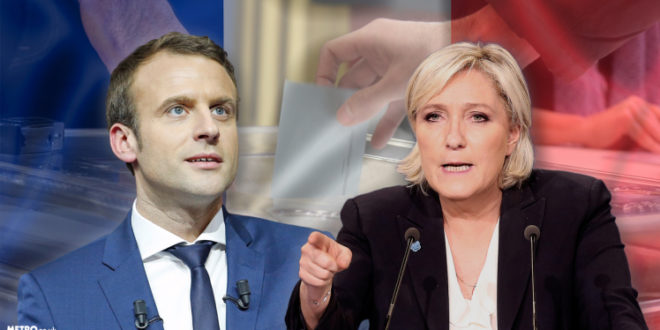By Shehab Al Makahleh •
The first round of French presidential elections was held on Sunday April 23rd. Exit results show that the May 7th run-off will be between Marine Le Pen and Emmanuel Macron. Far Right National Front candidate Le Pen’s victory will take the country towards exit from the EU political umbrella and removal of one of the EU’s key pillars.
As several countries are exhibiting so-called populist trend or nationalist patriotism, the EU will be losing many members after Brexit, and likely Frexit have set an example for others to follow. French EU-breakup would create a domino effect, as it will signify the actual dismemberment of the EU before 2021 ― France being one of the Union’s founding members. Numerous indicators signal that other key European countries, including Italy, Poland, and the Baltics are considering exiting the EU as well.
Le Pen was expected to exceed poll data by recording more than 27 per cent of the votes in the first round according to polls conducted by OpinionWay.
Political analysts believed that Le Pen would easily garner this percentage in the first round, leaving her main competitor Emmanuel Macron of the Centrist Party second with around 23 percent.
The poll conducted on 1500 eligible voters revealed that Le Pen is considered qualified to lead the country at a time when the patriotic feeling is on the rise among the French people who prefer to regain their own national identity.
The French seemed to prefer Le Pen as her speeches and campaign rallies addressed the key issues pertaining to domestic issues, such as identity, liberties, and the rising unemployment rates.
She also clamped down on the EU immigration rules, stating that France has more than 7 million jobless citizens, and more than 9 million living in poverty, demanding that the immigration should be restricted.
To the outside world, however, Le Pen is better known as a passionate advocate of independent France seeking to follow the Britain’s path out of the EU. She pledged that she will not be “the vice chancellor of Madame Merkel” or “the salesperson for a multinational group.”
Le Pen reiterated in her political debate: “I want to be the president of the French Republic, truly. I am not going to become involved in a vague region in Europe.”
She stressed that her country’s independence is a core value for the French people to whom she promised, if she wins, to “defend their values and traditions”.
Macron, a pro-EU candidate, rejected the idea of Frexit, arguing that Brexit turned out to be a much more tumultuous process than its backers had expected. Macron who served as minister of economy, said: “All those who said Brexit will be wonderful… ran away and hid.”
These polls now seem to have gotten few things wrong about the sentiment of the French polity, and although they have marked an end of the traditional parties, the presidential outcome is far from certain. According to some indications following the just concluded first round, the majority of voters who chose two other major candidates, Jean-Luc Mélenchon and Francois Fillon are likely to give their support to Le Pen.
According to these projections Le Pen is expected to win the presidential race, in the second round, with 60 per cent of the vote in contrast to Macron’s 40 per cent.
Francois Fillon from the “Les Republicans Party” was expected to lose in the first round because he showed unwavering commitment to the EU and its laws at the expense of the French and their national and social interests. Fillon said that holding a Frexit referendum would “drag the country into social and economic chaos”, a statement that already proved false in the Brexit campaign.
Le Pen and Trump
At this stage French elections in many aspects resemble the last US elections, with the difference that the liberal candidate in the US was a female, and she lost, while the more conservative was a male, and he is now the 45th US president. In France, on the other hand, Ms Le Pen is the conservative candidate and a female, and has great chances of winning.
Madame Le Pen as a National Front leader has compared Muslims praying in the streets to Nazis who occupied France in WWII. She is using the same rhetoric that the US President Donald Trump has used during his campaign against Muslims. Nowadays, she has become a vocal supporter of the American president and adopts his strategy for the race towards presidency.
If she wins, as she’s expected to, France will be under heavy pressure from the 5 million Muslims living in the country. If she continues with preaching hatred against them, this would likely prompt some of them to “lone wolf” terrorist acts, with the application of new techniques starting from Nice, to Marseille and Paris, by targeting the country’s symbols including the Arc De la Triumph.
In terms of dealing with terrorism and the Middle Eastern crises, as Le Pen is pro-Kurdish and calls for their independence, she is likely to be sending troops via Turkey to Northern Iraq to help facilitate the establishment of a new Kurdish state on Iraqi territory.
Shehab Al Makahleh is Geostrategic Media co-founder, senior political and media advisor in the Middle East
 Geostrategic Media Political Commentary, Analysis, Security, Defense
Geostrategic Media Political Commentary, Analysis, Security, Defense





